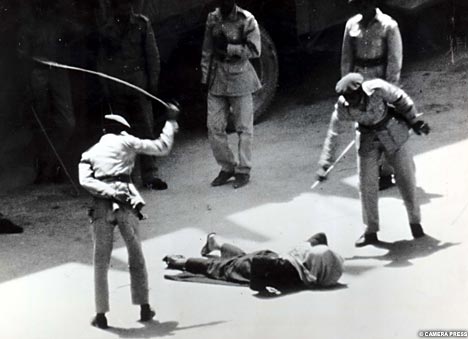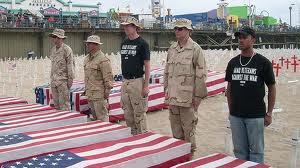 |
|
|
| • • |
Despotism in Saudi ArabiaWritten by Stephen Lendman Date: December 31, 2011 Subject: Police State Saudi Arabian State Terror - Stephen Lendman Annually, the State Department publishes human rights reports for over 190 countries. Its latest April 8, 2011 Saudi Arabia assessment discusses "significant human rights abuses and the inability of citizens to change its absolute monarchal rule. Abuses include: • "torture and physical abuse; • poor prison and detention center conditions; • arbitrary arrest and incommunicado detention; • denial of fair and public trials and lack of due process in the judicial system; • political prisoners; • restrictions on civil liberties such as freedom of speech (including the Internet); • assembly, association, movement, and severe restrictions on religious freedom; and • corruption and lack of transparency." Also mentioned were inequality and violence against women, human trafficking, no labor rights, discrimination on the basis of gender, religion, sect and ethnicity, and violations of children's rights. Saudi's absolute monarchal rule is despotic, lawless and brutal. It's a police state practicing state terrorism internally and regionally. It's also Washington's main Middle East ally after Israel. In early December, Amnesty International (AI) published a report on the kingdom titled, "Saudi Arabia: Repression in the Name of Security." Largely unnoticed in the West like the State Department's April assessment, major media scoundrels suppressed its ugly findings. AI quoted Khaled al-Johani addressing reporters in Riyadh on the March 11, 2011 "Day of Rage," saying: "I am here to say we need democracy. We need freedom. We need to speak freely. We need no one to stop us from expressing our opinions." Shortly afterward he was arrested and charged with "communicating with the foreign media." He's now held incommunicado in Saudi's notoriously repressive prison system. On March 5, Press TV reported the arrest and detention of senior Saudi cleric Sheikh Tawfiq al-Amer. At issue was his call for constitutional monarchal rule. On March 23, Press TV reported 100 Shia protesters arrested after participating in anti-government demonstrations for political reforms and immediate political prisoner releases. More recently on December 5, Press TV reported large anti-government protests in Saudi Arabia's oil-rich Eastern Province and another one on December 9 in Awamiyah, an Eastern Persian Gulf village. Last April, Saudi's Interior Ministry said 5,831 people were arrested for being associated with a "deviant group," allegedly Al Qaeda. About 600 were sentenced. Another 600 awaited trials. Unsubstantiated terrorist related charges assures long, repressive prison terms. A more recent high-profile case involved 16 men, including nine prominent reformists. They were sentenced to up to 30 years for allegedly trying to seize power by financing terrorism with laundered money. Their charges and trial had no legitimacy whatever. They were victimized for advocating political change and human rights. AI said Saudi authorities "launched a new wave of repression in the name of security." Human rights protesters have been brutally oppressed. At the same time, a new anti-terror law exacerbates the absence of civil and human rights. Last June, AI got a leaked copy. Provisions in it include: • prosecuting peaceful dissent as terrorism and "harming the reputation of the state or its position;" • a minimum of 10 years imprisonment for anyone questioning the integrity of the king or crown prince; • authorities will have carte blanche power to detain alleged security suspects indefinitely without charge or trial; and • terrorism's definition is expanded to include endangering "national unity" and/or questioning the integrity of the king or regime. Overall, abusive practices will be legalized, including an anything goes policy of crushing dissent. Saudi Arabia's Repressive Government Saudi state power rests solely with the king and ruling Al Saud family. He especially wields absolute power to rule despotically. The nation's Constitution affords ordinary citizens and other residents no rights. Women are especially marginalized and denied. The Constitution gives sole power to the ruling monarchy. Saudi Basic Law, adopted in 1992, declared the kingdom a monarchy ruled by the sons and grandsons of King Abd Al Aziz Al Saud. It also proclaimed Sharia (Islamic) law supreme. Political parties and national elections are prohibited. Saudi kings appoint a Council of Ministers, including a prime minister, first and second deputies, 20 ministers, various advisors, and heads of major autonomous organizations. Thirteen provinces comprise the kingdom. The ruling monarch appoints their governors. They're either princes or close royal family relatives. In 1993, ministers became subject to four-year term limitations. In 1997, a Consultative Council was expanded from 60 to 90 members. Legislation is by Council of Ministers resolution, subject to royal approval. Democracy is a dirty word. Saudi's 27 million residents have no rights whatever. The media are severely constrained. Anyone dissenting is subject to arbitrary arrest and detention, including political critics, bloggers, academics, foreign nationals, and others. On September 25, King Abdullah said women, beginning in 2015, will be allowed to run in municipal elections, and be appointed to the Shura Council monarchal advisory body. Nonetheless, they're severely restricted. They can't travel, drive, engage in paid work or higher education. They also can't marry without male custodian permission. Rage Bubbling Up Against the Regime Perhaps mindful of other regional protests, Saudis have begun rallying publicly for change. They demand human rights be respected. They want social and political reforms, including free, open and fair elections. They also want political prisoners released. In response, severe crackdowns followed. Hundreds of peaceful protesters were arrested and detained without trial. Others were charged with "vague security-related and other offenses. (AI) considers many of (them) prisoners of conscience, held solely for peacefully expressing their rights to freedom of expression and assembly." In recent years, thousands have been detained on security grounds and remain imprisoned under horrific conditions. Victims include clerics, alleged Al Qaeda members, anyone with alleged connections or sympathies, and others suspected of anti-regime sentiment or its ties to Washington and other Western states. Everyone arrested for security reasons faces torture and other forms of abuse. It's commonplace "because interrogators know that they can commit their crimes without fear of punishment." Abuse is also encouraged by the "ready acceptance by courts of 'confessions' forced (from) detainees (by) beatings, electric shocks, and other forms of torture and ill-treatment." Many detainees are untried. Others brought to court face grossly unfair proceedings, including secret ones with no right of appeal. Since established in October 2008, Saudi's Specialized Criminal Court hears them. Victims are mostly human rights defenders, political reform activists, members of religious minorities, and many others guilty of no internationally recognized offense. In the past, sporadic political violence occurred against state institutions, oil installations and Western nationals. Severe crackdowns followed. AI's report focused mainly on 2011 developments. Philip Luther, AI's Middle East/North Africa director said: "Peaceful protesters and supporters of political reform in the country have been targeted for arrest in an attempt to stamp out the kinds of call for reform that have echoed across the region." Many arrested are charged with "disrupting order." Some are forced to sign pledges to never again protest. In addition, they're forbidden to travel. Others face secret kangaroo proceedings. Those affected are guilty by accusation. A Final Comment Washington has close ties to despotic regional regimes, including Saudi Arabia. It uses them advantageously to advance its Greater Middle East project for unchallenged dominance. Wars are waged to replace independent regimes with client ones. Saudi and other regional governments rule despotically. They're also US proxies when called on, including against Gaddafi's Libya, Bahrain, Yemen, Syria. As a result, they're rewarded for partnering with Washington's worst crimes. Who said it didn't pay! Stephen Lendman lives in Chicago and can be reached at lendmanstephen@sbcglobal.net. Also visit his blog site at sjlendman.blogspot.com and listen to cutting-edge discussions with distinguished guests on the Progressive Radio News Hour on the Progressive Radio Network Thursdays at 10AM US Central time and Saturdays and Sundays at noon. All programs are archived for easy listening. http://www.progressiveradionetwork.com/the-progressive-news-hour/. Send Letter to Editor |
Friday, December 30, 2011
Saudi Arabian State Terror
China push to put astronaut on the moon

12-30-2011 • www.ft.com
While Chinese scientists have previously discussed the possibility of a manned lunar mission, a government white paper published on Thursday is the first public government document to enshrine it as a policy goal.
China will “conduct studies on the preliminary plan for a human lunar landing”, the white paper said.
Although a manned moon mission is still some time off – Chinese
experts say after 2020 – the statement highlights Beijing’s soaring
ambitions just five months after the US retired its space shuttle programme
. “Chinese people are the same as people around the world,” Zhang Wei,
an official with China’s National Space Administration, said at a
briefing. “When looking up at the starry sky, we are full of longing and
yearning for the vast universe.”
According to the white paper, which serves as a blueprint for the next five years, China will develop new satellites, accelerate efforts to build a space station and strengthen its research in space. Laying the foundation for a mission to the moon, the government also plans to launch unmanned lunar probes and make “new technological breakthroughs” in human space flights by 2016.
Read Full StoryAccording to the white paper, which serves as a blueprint for the next five years, China will develop new satellites, accelerate efforts to build a space station and strengthen its research in space. Laying the foundation for a mission to the moon, the government also plans to launch unmanned lunar probes and make “new technological breakthroughs” in human space flights by 2016.
Reported by Donna Hancock
Was It Worth It?

12-30-2011 • www.lewrockwell.com/Laurence Vance
Would you sacrifice
your firstborn son to establish a democracy in country that had
a dictatorship? How about giving up your son to effect a regime
change? What about exchanging your son to end the oppression of
minorities? How about trading your son in return for a country holding
elections?
I don’t know of any American mother or father that would do such a thing. I wouldn’t give a finger from one of my sons to do any of these things. Some Americans, however, wouldn’t mind it if some other American’s son came back from some foreign war in a box with only a finger that was recognizable – just as long as it wasn’t their son.
Now that the war in Iraq is officially over, I keep hearing from apologists for the war about how it was worth it. I keep hearing that because Saddam Hussein is gone, Iraq has a Constitution, Iraqis have freedom, and Iraq holds elections that all the death and destruction was worth it. "We are leaving behind a sovereign, stable and self-reliant Iraq, with a representative government that was elected by its people," President Obama told the troops at Fort Bragg. "I think the price has been worth it, to establish a stable government in a very important region of the world," said Defense Secretary Leon Panetta. Of course, none of Panetta’s three sons died in Iraq.
Okay, suppose it’s all true – and then some. Suppose it’s even better than anyone could have imagined. What if Iraq is now a model democracy for the rest of the world? What if Iraq now has a constitution that rivals our own? What if there is now no more sectarian violence in Iraq? What if Iraq now has a free market? What if Iraq is now an American ally? What if Iraq is now a friend of Israel? What if Iraqis now have freedom of speech and freedom of religion? What if Iraq now respects the rights of women and minorities? What if all Iraqi children are now in school? What if Baghdad is really the best city on earth instead of the worst?
Read Full StoryI don’t know of any American mother or father that would do such a thing. I wouldn’t give a finger from one of my sons to do any of these things. Some Americans, however, wouldn’t mind it if some other American’s son came back from some foreign war in a box with only a finger that was recognizable – just as long as it wasn’t their son.
Now that the war in Iraq is officially over, I keep hearing from apologists for the war about how it was worth it. I keep hearing that because Saddam Hussein is gone, Iraq has a Constitution, Iraqis have freedom, and Iraq holds elections that all the death and destruction was worth it. "We are leaving behind a sovereign, stable and self-reliant Iraq, with a representative government that was elected by its people," President Obama told the troops at Fort Bragg. "I think the price has been worth it, to establish a stable government in a very important region of the world," said Defense Secretary Leon Panetta. Of course, none of Panetta’s three sons died in Iraq.
Okay, suppose it’s all true – and then some. Suppose it’s even better than anyone could have imagined. What if Iraq is now a model democracy for the rest of the world? What if Iraq now has a constitution that rivals our own? What if there is now no more sectarian violence in Iraq? What if Iraq now has a free market? What if Iraq is now an American ally? What if Iraq is now a friend of Israel? What if Iraqis now have freedom of speech and freedom of religion? What if Iraq now respects the rights of women and minorities? What if all Iraqi children are now in school? What if Baghdad is really the best city on earth instead of the worst?
Reported by Donna Hancock
The Compassion of Dr. Ron Paul...
To help air a broadcast version of this ad in early primary states, donate here http://revolutionpac.com/compassion **PLEASE DO NOT RE-UPLOAD** James Williams of Matagorda County, Texas recounts a touching true story. Living in a still prejudice Texas In 1972, his wife had a complication with her pregnancy. No doctors would care for her or deliver their bi-racial child. In fact one of the hospital nurses called the police on James. Dr. Ron Paul was notified and took her in, delivering their stillborn baby. Because of the compassion of Dr. Ron Paul, the Williams' never received a hospital bill for the delivery. Ron Paul views every human being as a unique individual, afforded the rights endowed by our creator and codified in the Bill of Rights.
Subscribe to:
Comments (Atom)

